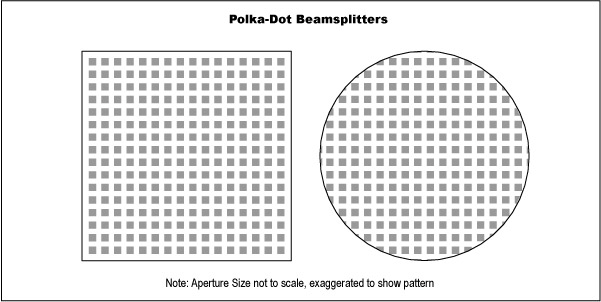
VIS-NIR Polka-Dot Beamsplitters feature a constant reflection/transmission ratio over the VIS to NIR spectrum. A vacuum deposited enhanced aluminum coating on SCHOTT B270 substrates, with fixed square apertures guarantees 30/70, 50/50 reflection/transmission ratios from 400 to 2000nm. Incident light is reflected by the coated area and is transmitted through the surrounding uncoated substrate. VIS-NIR Polka-Dot Beamsplitters are not angle sensitive, therefore they are ideal for splitting energy from a radiant light source with a beam diameter of at least 2mm. These beamsplitters are especially useful with broadband, extended sources, such as tungsten, halogen, and xenon lamps, and for use in monochromators, spectrophotometers, and other optical systems.
Note: The surface of these beamsplitters is very sensitive and should never be touched when handling the optic. If cleaning is required to remove dust particles, non-contact cleaning using clean compressed air is recommended.

or view regional numbers
QUOTE TOOL
enter stock numbers to begin
Copyright 2023 | Edmund Optics, Ltd Unit 1, Opus Avenue, Nether Poppleton, York, YO26 6BL, UK
California Consumer Privacy Acts (CCPA): Do Not Sell or Share My Personal Information
California Transparency in Supply Chains Act